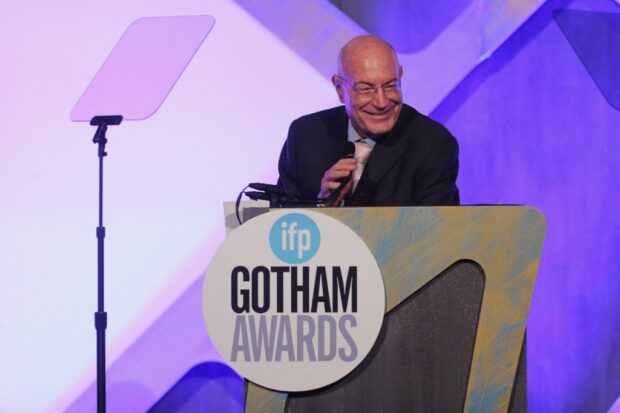
NEW YORK, NY – NOVEMBER 28: Arnon Milchan speaks onstage at IFP’s 26th Annual Gotham Independent Film Awards at Cipriani, Wall Street on November 28, 2016 in New York City. Jemal Countess/Getty Images for IFP/AFP (Photo by Jemal Countess / GETTY IMAGES NORTH AMERICA / Getty Images via AFP)
JERUSALEM — Hollywood producer Arnon Milchan was testifying Sunday at Israeli Prime Minister Benjamin Netanyahu’s corruption trial to answer questions about an alleged “supply line” of champagne and cigars funneled to the Israeli leader and his wife said to have been in exchange for help with Milchan’s personal and business needs.
Milchan, who appeared by videoconference from the English city of Brighton, near where he is based, is a key witness whose testimony is essential for prosecutors who are trying to prove that Netanyahu committed fraud and breach of trust in one of three cases brought against him.
Prosecutors hope Milchan’s testimony, which extends through this week and next, will paint a picture of plush favors granted to Netanyahu and his wife that allegedly spurred the Israeli leader to use his position of power to advance Milchan’s interests. The defense will try to lay out its case that Netanyahu wasn’t acting in Milchan’s personal interests and that the gifts were just friendly gestures.
Prosecution and defense lawyers are questioning Milchan in a hotel conference room in Brighton. While no journalists are allowed to be present there, Netanyahu’s wife Sara, on a private visit to Britain, will sit in.
Milchan’s testimony, expected to last six hours a day, is being aired in a Jerusalem courtroom for judges and other lawyers — who can also ask questions of him — and for journalists and other attendees to watch. Shortly after the testimony began, Netanyahu arrived in the courtroom. Milchan is not charged in the case.
Israeli Channel 13 aired footage of Sara Netanyahu and Milchan walking separately up the stairs in the hotel. A screen was set up in the Jerusalem courtroom to air the testimony.
According to the indictment, Milchan, whose production credits include such hits as “Pretty Woman” and “12 Years a Slave,” gave Netanyahu and his wife boxes of cigars and crates of champagne over a period of several years that, along with jewelry, amounted to a value of nearly $200,000 — what the indictment describes as a “supply line” of lavish gifts.
The indictment accuses Netanyahu of using his influential perch to assist Milchan to secure a U.S. visa extension by drawing on his diplomatic contacts, among them former Secretary of State John Kerry. Prosecutors also accuse Netanyahu of working to push legislation that would have granted Milchan millions in tax breaks.
“Considering the many links between the defendant Netanyahu and Milchan, the defendant Netanyahu should have entirely avoided dealing with Milchan’s affairs,” the indictment says, adding that Netanyahu and Milchan, an Israeli citizen, have had ties since 1999.
Milchan is testifying in one of three cases being brought against Netanyahu. The other two, for which he is charged with bribery, fraud and breach of trust, accuse Netanyahu of exchanging regulatory favors with powerful media moguls for more positive coverage.
Netanyahu denies wrongdoing, claiming he is the victim of a witch hunt orchestrated by a liberal media and a biased justice system.
Netanyahu’s legal woes have dogged him politically, putting his fitness to rule while on trial at the center of a political crisis that sent Israelis to the polls for five times in under four years.
They also have fueled accusations by critics that Netanyahu is pushing a contentious government plan to overhaul Israel’s judiciary as a way to escape the charges. Netanyahu denies those charges.
The trial, which began in 2020 and has still not heard from Netanyahu himself, has featured more than 40 prosecution witnesses, including some of Netanyahu’s closest former confidants who turned against the premier.
Witness accounts have shed light not only on the three cases but also revealed sensational details about Netanyahu’s character and his family’s reputation for living off the largesse of taxpayers and wealthy supporters. Milchan’s aide, Hadas Klein, testified last year that the family “loves gifts.”
The idea of a plea bargain has repeatedly surfaced, but prosecutors for now appear determined to see through the trial, despite reports last week that the judges warned them that the more serious crime of bribery will be hard to prove.